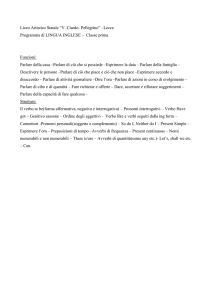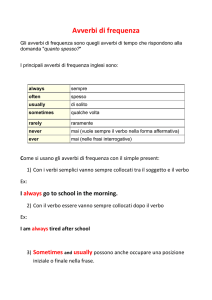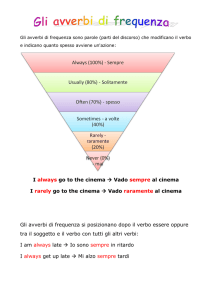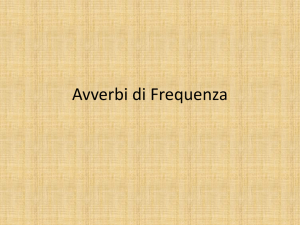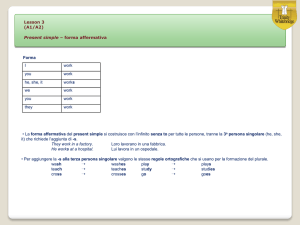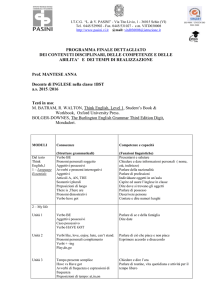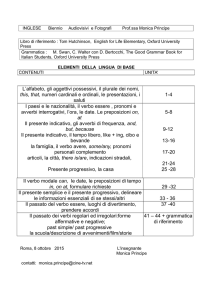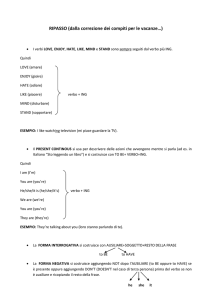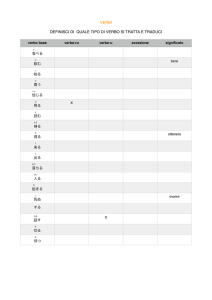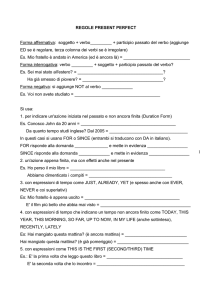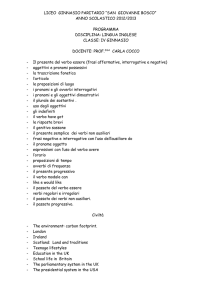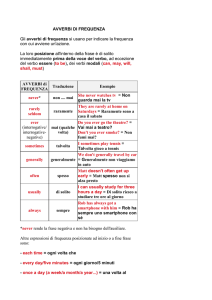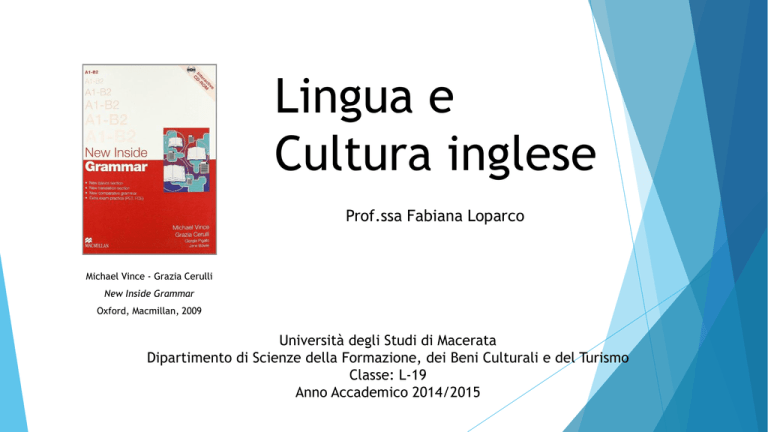
Lingua e
Cultura inglese
Prof.ssa Fabiana Loparco
Michael Vince - Grazia Cerulli
New Inside Grammar
Oxford, Macmillan, 2009
Università degli Studi di Macerata
Dipartimento di Scienze della Formazione, dei Beni Culturali e del Turismo
Classe: L-19
Anno Accademico 2014/2015
Lesson number: 18
1. Articoli o possessivi con parti del corpo
2. Inversione con avverbi di significato negativo
3. “And” and “But” type linkers
4. Posizione di alcuni avverbi
1. Articoli o possessivi con parti del corpo
Di norma con parti del corpo si usa l’aggettivo possessivo
She spilt boiling water over her foot
Quando il possessore è complemento oggetto, si usa in genere the nel complemento indiretto che segue
She kissed the child on the cheek (il possessore the child è complemento oggetto)
He punched the man in the face (il possessore the man è complemento oggetto)
Analogalmente, in una frase passiva si usa l’articolo quando il possessore è il soggetto
The man was punched in the face
I was hit on the head
In espressioni come a pain in…, a bruise on…, a scar on… sia l’articolo sia il possessivo sono possibili
I’ve got a pain in the/my leg
The man had a scar on the/his right cheek
2. Inversione con avverbi di significato negativo
Quando avverbi di significato negativo o restrittivo come never, nowhere, neither/nor, rarely, seldom,
only, not only, hardly, scarcely, in no way, for no reason… sono posti all’inizio della frase, l’ordine
delle parole è quello della frase interrogativa per cui soggetto e verbo vengono invertiti. Questa
inversione avviene solo nell'inglese scritto, mai all'orale. Nella costruzione della frase si seguiranno,
pertanto, le stesse regole valide per la costruzione della forma interrogativa dei vari tempi verbali.
Not only did he arrive an hour late, but he also forgot to bring the files we needed
Non solo è arrivato un’ora in ritardo, ma si è anche dimenticato le schede di cui avevamo bisogno
Only after I had got home from the shops did I find out that one of the cup was cracked
Solo dopo essere tornato a casa ho scoperto che una tazza era inclinata
Hardly had I gone to sleep, when I was woken up by a loud scream
Mi ero appena addormentato, quando fui svegliato da un grido acuto
Exercises
Riscrivi le frasi con la regola dell’inversione degli avverbi negativi
•
I have never seen such courage.
Never _____________ such courage.
•
She rarely left the house.
Rarely _________ the house.
•
She did not only the cooking but the cleaning as well.
Not only _____________ the cooking, but the cleaning as well.
Exercises
Riscrivi le frasi con la regola dell’inversione degli avverbi negativi
•
I have never seen such courage.
Never have I seen such courage.
•
She rarely left the house.
Rarely did she leave the house.
•
She did not only the cooking but the cleaning as well.
Not only did she do the cooking, but the cleaning as well.
3. Connettivi/“And” and “But” type linkers
Per aggiungere un’informazione o rafforzare un’idea si possono usare i seguenti connettivi:
What’s more… (informale)
On the top of that… (informale)
per di più…
In addition…
Besides…
Furthermore… (formale)
inoltre…
Moreover… (formale)
Nota: Besides è anche una preposizione (Besides Jim… = Oltre a Jim…). Non va confuso con la preposizione
beside (She sat beside Jim = Si sedette accanto a Jim)
Per esprimere concessione o contrasto vengono usati i seguenti connettivi:
However…
ma, tuttavia, comunque
Still…
(And) yet…
Even so…
eppure, tuttavia…
Neverthless (formale)
…, though (generalmente
in fine frase)
All the same…
In any case…
In spite of that…
Despite that…
comunque, ad ogni modo
nonostante ciò
Exercises
Usa i linkers though, in any case, in spite of that, what’s more per completare la frase
•
He’s never been to Great Britain. ____________ he’s got a perfect British accent
•
I agree that Robert is a bit moody. I quite like him, _____________
•
I think I should change my car. It’s very old and _____________ it uses a lot of petrol
•
Gloria and David have got quite different tastes. ___________ their marriage seems to be
successful
Exercises
Usa i linkers though, in any case, in spite of that, what’s more per completare la frase
•
He’s never been to Great Britain. In spite of that he’s got a perfect British accent
•
I agree that Robert is a bit moody. I quite like him, though
•
I think I should change my car. It’s very old and what’s more it uses a lot of petrol
•
Gloria and David have got quite different tastes. In any case their marriage seems to be
successful
4. Posizione di alcuni avverbi
Forme avverbiali come very much e very well non possono mai essere poste fra verbo e complemento
oggetto.
He speaks English very well
Parla l’inglese molto bene
Mice like cheese very much
Ai topi piace molto il formaggio
Se il complemento oggetto è dato da un’espressione lunga very much può essere posto prima del verbo
I very much like going for long walks along the shore
Mi piace molto fare lunghe passeggiate lungo la spiaggia
L’avverbio only può occupare posizioni diverse nella frase. La posizione più comune è quella degli
avverbi di frequenza, per cui si colloca immediatamente tra soggetto e verbo principale (se il verbo è
un tempo semplice), tra verbo e verbo (se è un tempo composto), dopo il verbo essere e avere.
He only informed us this morning
Ci ha informati solo questa mattina
È posto davanti alla parola cui si riferisce se questa è soggetto o se la si vuole mettere più in evidenza.
Può essere a volte posto dopo la parola cui si riferisce per maggior enfasi
Only Ron was informed
È stato informato solo Ron
I’m staying there only two days (più enfatico: two days only)
Mi fermerò là solo due giorni/due giorni soltanto
Avverbi di intensità come greatly, totally, absolutely, almost, quite, rather… vengono posti davanti al
verbo che modificano
We greatly appreciate your help
Abbiamo apprezzato molto il vostro aiuto
I quite liked that film
Mi è piaciuto abbastanza quel film
The thought of it absolutely terrifies me
Il solo pensiero mi terrorizza
Exercises
Ordina le parole in modo corretto
•
Henry/meeting/doesn’t/much/people/like/very
_______________________________
•
We/enjoyed/the/quite/meal/we/last/had/night
_______________________________
•
I/your/greatly/letter/appreciated
_______________________________
•
I/with/totally/you/disagree
_______________________________
Exercises
Ordina le parole in modo corretto
•
Henry/meeting/doesn’t/much/people/like/very
Henry doesn’t like meeting people very much
•
We/enjoyed/the/quite/meal/we/last/had/night
We quite enjoyed the meal we had last night
•
I/your/greatly/letter/appreciated
I greatly appreciated your letter
•
I/with/totally/you/disagree
I totally disagree with you
Per approfondire ed esercitarsi:
New Inside Grammar
Lesson & excercises
pp. 374-377; 382-383
English Children’s
Literature
Harry Potter and the
Philosopher‘s Stone
Author: Joanne "Jo" Rowling
Publication date: June 26, 1997

